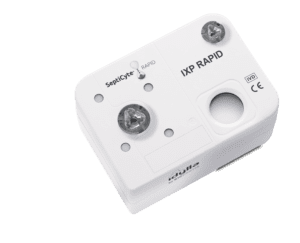The previous articles in this series laid out some of the issues in health care affecting testing, and the value of data. This article looks at some specific problems and solutions.
Speeding up Test Development
We’ve seen with COVID-19 how quickly a virus can evolve and how hard it is to design both tests and vaccinations that accommodate different variants. Virax Biolabs uses data from the World Health Organization and others to develop tests quickly. For instance, new viral variants tend to spread in the southern hemisphere before hitting the northern hemisphere in our Winter, so Virax can check existing data to prepare better tests for the North.
The company is developing a T-cell diagnostics and profiling platform called Virax Immune, to predict an individual’s immune response to viral threats. Tomasz George, Ph.D., chief scientific officer, explained that testing for T-cells shows how well you’re protected from a given viral threat or after vaccinations. A good result might save you from needing a vaccine booster shot.
Virax Immune is also planning to use AI to determine how well protected someone is from viral threats. They intend to collect information from the patient to help determine risk, such as whether the patient has pulmonary problems. They also plan to offer APIs to labs and public health organizations, delivering test results securely through an app along with advice about how to handle the risk.
The company’s diagnostic platform, ViraxClear, distributes a range of highly accurate diagnostic tests globally. For Virax Immune, the company’s initial focus is COVID-19, but this T-cell testing platform can also be adapted to influenza, mpox (originally called monkeypox), varicella-zoster, bird flu, respiratory syncytial virus (RSV), and human papillomavirus. Virax Biolabs is also exploring how to get rapid results in the home.
More Accurate Detection of Sepsis
Sepsis is one of the most dreaded hospital-spawned conditions: It’s common and can quickly be fatal. According to Dr. Rolland Carlson, CEO of Immunexpress, a sepsis diagnosis often takes 24 hours—far too long for many patients.
Normally the doctor looks at a lot of clinical inputs, such as a blood culture, and evaluates the combined meaning of blood cell count, lactate levels, protein markers, and more—12 to 14 different variables. Carlson says there is no “gold standard” or “ground truth.” Early warning systems for sepsis deliver many false alarms. Unnecessary treatment is common, with negative impacts on costs and sometimes patients. Unnecessary sepsis treatment also contributes to the overuse of antibiotics, which can lead to drug-resistant bacteria.
Immunexpress offers a test called SeptiCyte that quickly and accurately indicates the risk of sepsis by measuring RNA from white blood cells. The device can turn around a test within one hour. The SeptiCyte cartridge fits in the hand, running on a nearby patient testing platform, and operates at room temperature instead of needing clean rooms and refrigeration (Figure 1).

In general, according to Carlson, DNA and RNA testing is relatively new. It can give clearer, yes/no results, particularly for some kinds of cancer.
Immunexpress has also demonstrated that the Septicyte RAPID test can be used to stratify Covid severity.
Testing in the Home
Dr. Bernard Esquivel, head of clinical innovation at ixlayer, stresses the importance of in-home testing, particularly when tests are needed frequently. For instance, people with diabetes want to know their A1C every three or six months. ixlayer can send them reminders as well as test kits. The service takes efforts to report results in a fashion patients can understand and use.
ixlayer makes sure home tests meet the same CLIA standards as lab tests. The company also works with labs to make sure they comply with standards. The service reviews protocols to make sure a lab-developed test is accurate and that samples are sent properly.
Esquivel says, “ixlayer partners with CLIA-accredited laboratories and performs a rigorous vetting process of their validations protocols and operational capabilities from the licensing perspective on a state-by-state basis. Also, ixlayer utilizes only FDA-approved sample collection devices following best practice standards, everything in HIPAA compliant environment.
In addition, their analytics help health care systems figure out who has gotten tested and what the follow-up was.
A number of tests, including the PCR test for COVID-19, require nurses or other trained staff. The urgency of delivering PCR tests has been reduced because the pandemic is easing up, but COVID-19 is still a major threat.
Hydreight, founded in 2018, offers at-home healthcare and wellness services in all 50 U.S. states. Patients use an app to book registered nurses, taking advantage of a regulation that allows nurses to serve patients outside of traditional medical facilities by having them work with oversight from a Hydreight medical director. COVID testing, intravenous (IV) therapy, and other health and wellness services are available on the platform.
According to CEO Shane Madden, services are booked through the Hydreight platform directly from the service provider. The platform does not yet work with insurers, so patients pay out of pocket. Still, the service can be worthwhile for convenience.
This series has surveyed the world of health care testing from the lab to the home. New devices, new ways of sharing data, and new algorithms are allowing tests to be performed more frequently and return more accurate results. The future lies with new sources of data that can help predict the need for tests as well as interpret the findings.













